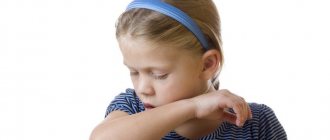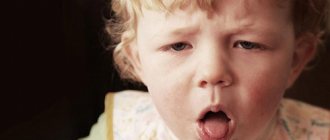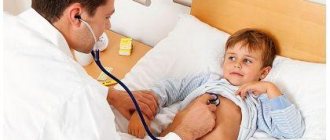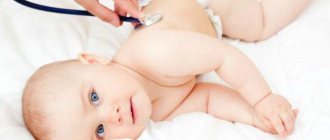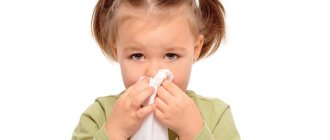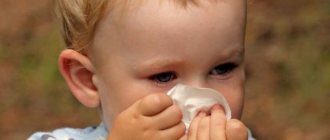Cough as a symptom quite often accompanies many diseases of the respiratory system. It can indicate the development of a viral or bacterial infection, and sometimes warns of the progression of serious pathologies. In addition, periodic cough may have nothing to do with inflammatory processes and diseases. But when it comes to our children, especially babies, mothers sometimes flinch at every sneeze or cough.
In this article we will discuss what a cough in an infant without fever may indicate, what are the basic principles of its treatment and in what situations you should immediately consult a doctor. We will also talk about ways to prevent diseases accompanied by cough.
Types of cough in infants
There are several main types of cough, each of which is characterized by a set of specific symptoms.
In medical practice, it is customary to distinguish three main types of cough, each of which is characterized by a specific clinical picture and etiology. Symptoms characteristic of the diseases listed below exclude an increase in body temperature.
Advice! Even if parents think that the cause of the cough is teething and, as a result, excessive drooling, they should still consult a doctor. Even a common cold can be fatal for a young child if treatment measures are not taken in a timely manner.
Barking
The term “barking cough” is usually understood as a dry and hacking cough, the sound of which is somewhat reminiscent of a dog barking. Most often, this type of cough is diagnosed in children under three years of age.
Advice! Usually, a barking cough is the first sign of a dangerous disease called false croup. If an attack occurs suddenly, at night, you should immediately seek medical help.
Dry
A dry chest cough without fever, not accompanied by sputum production, usually appears in the early and final stages of colds and viral diseases.
Advice! In order to make breathing somewhat easier and the cough less debilitating, it is necessary to constantly humidify the air in the room where the child is. You should also regularly ventilate the room and do wet cleaning.
Wet
If some amount of sputum is released during the coughing process, the cough is productive. A wet cough in a baby without fever appears due to the accumulation of a large amount of pathogenic mucus in the bronchi.
Advice! Recovery from the accumulation of mucus in the bronchi occurs when the respiratory tract is completely cleared of pathogenic microflora. There are many different means to speed up this process, however, they can only be used after the child has been examined by a doctor and prescribed appropriate treatment.
Etiology: Komarovsky’s opinion
The causes of cough are varied.
This can be either a banal disease or an allergic reaction. The opinion of the famous pediatrician Dr. Komarovsky reflects the postulates put forward by the vast majority of doctors: a cough is the first alarm bell indicating that the child is sick. But this symptom is by no means a separate and independent phenomenon. That is, the reflex appears only against the background of cumulative diseases or pathologies.
But if a baby has a dry cough without fever, this may well indicate much more serious pathologies. There are a limited number of reasons that can lead to the appearance of such a symptom.
The main ones are:
- Infections and viruses . Sore throat, acute respiratory infections, rhinitis, as well as many other diseases can lead to the appearance of a non-productive cough in the early stages.
- Allergy . The body of a baby, even one who is breastfed, reacts particularly acutely to various substances that come in, including through breast milk.
- Foreign objects . Care should be taken to ensure that there are no small objects within the child’s reach. Getting them into the respiratory tract can provoke not only a dry, paroxysmal cough, but also suffocation and respiratory arrest.
- Dry or polluted air . The most common reason why a baby develops a cough without fever is dry air or air saturated with particles of dust, dirt, and smoke. This cough option is the safest.
Advice! Photo materials, as well as the video in this article, will allow you to learn in more detail about the reasons why cough appears. However, even with full confidence that the etiology of coughing attacks has been determined correctly, before applying any treatment in practice, you should consult a doctor.
Cough in children under one year of age
According to statistics and research by pediatricians, acute respiratory infections, surprisingly, are not the most common cause of cough in infants; more often, their cough occurs as a result of other, non-infectious factors. Parents of young children often encounter unproductive coughing, which is due to the increased viscosity of bronchial secretions. The thing is that even in a healthy small child there is a process of disruption of the “sliding” of sputum in the respiratory tract, insufficient activity of the ciliated epithelium of the bronchi and the contractile apparatus.
In other words, a newborn baby does not yet know how to cough properly, as adults do. Natural mucus can stagnate in the respiratory tract and over time cause attacks similar to a barking infectious cough. Underdevelopment of the respiratory muscles in a child sometimes leads to the fact that it becomes difficult to determine what is bothering him, whether he is coughing or simply crying. And at this time, it is very important for parents not to panic and not to start treating the child with the first antitussive drugs available, offering him syrups, tablets and inhalations without consulting a doctor.
Cough in a 1 month old baby
The respiratory system of newborn children is distinguished by the presence of a number of age-related characteristics. They can lead to the development of complications that are typical for the youngest. For example, the mucous membrane of the respiratory system in infants is supplied with blood more abundantly than in older children. This can lead to swelling and, as a result, difficulty in nasal breathing.
In addition, newborn babies have physiologically narrow nasal passages, which makes it difficult for them to breathe. With a viral or bacterial runny nose, a child who, due to his age, does not yet know how to blow his nose and breathe through his mouth, begins to literally choke on mucus. This is how a cough appears, which can manifest itself in the form of crying - in this way the child tries to get rid of discomfort and clear the nasal passages.
Also, in newborn children, the trachea and bronchi are anatomically narrow. For this reason, any inflammation in the respiratory organs can lead to intermittent air supply to the alveoli of the lungs, which can lead to respiratory failure.
Only a doctor can determine the exact cause of cough in a one-month-old baby, so it is better to avoid self-medication and if the child’s behavior and the nature of his crying change, immediately contact a specialist.
Cough in a 2 month old baby
Breathing in children in the first months of life, including infants at 2 months, occurs through contraction of the diaphragm. This is the muscle that separates the chest cavity from the abdominal cavity. Older children and adults also “help” the intercostal muscles and abdominal muscles in the breathing process, while an infant uses only the diaphragm.
As a result, such breathing often leads to the fact that any diseases and dysfunctions of the gastrointestinal tract also lead to problems with the functioning of the respiratory system. Few parents know that a baby can cough not only due to infections, but also when conditions and diseases such as colic, increased gas formation and constipation appear.
If you, without following the advice of modern pediatricians, swaddle your newborn tightly and thereby limit the mobility of his chest and diaphragm, for this reason the child may also begin to cough.
Cough in a 3 month old baby
Allergies are also among the causes of cough reflex manifestations in 3-month-old children. In young children, the intestinal walls are extremely permeable, which increases the risk of developing allergic reactions, especially food ones. Most often, food products consumed by a nursing mother become provocateurs. Moreover, allergies can be caused not only by such well-known allergens as chocolate, citrus fruits, red fish, strawberries, but also by any other products that at first glance may be completely harmless. It's all about the individual sensitivity of the child's body. A child can also have allergic reactions to the mother’s eau de parfum or her cosmetics.
The risk of developing allergies is high in those children whose parents suffer from asthma, atopic dermatitis and themselves often experience allergic rhinitis. If both parents suffer from allergic diseases, their child has a 50-80% chance of developing allergies. It is not necessary that the allergy will manifest itself before the age of one, but still, when a newborn develops a cough, it is necessary to take this factor into account.
To identify the causes of allergies in a baby, the help of a pediatrician and special diagnostics are necessary.
Cough in a 4 month old baby
An unhealthy microclimate in the room where a child lives can also activate the cough reflex. The optimal air temperature in a newborn's room is 22-24 0C. Sufficient air humidity is also very important. If the air is too dry, the mucous membranes in the child’s respiratory organs dry out and begin to secrete a special secretion to protect themselves, which can lead to a runny nose and nasal congestion. In this case, there may be no discharge from the nose; the child simply “grunts” his nose often, trying to get rid of the discomfort. As already mentioned, the nasal passages of a newborn are narrow and short, so nasal congestion and swelling in young children create much more discomfort than in adults. The formation of dry crusts in the nose further complicates the situation.
In dry air there is a deficiency of oxygen, which is necessary for the functioning of the body. Due to lack of oxygen, infants become more irritable, are capricious and sleep poorly, cough and thereby lead parents to think that infectious diseases are to blame. Dry mucous membranes of the nasopharynx in the absence of sufficiently humid air actually cease to trap pathogenic microorganisms, which penetrate the child’s body and increase the risk of developing ARVI and other diseases.
To prevent coughing from dry air in young children, it is necessary to maintain room humidity at 60-70% using humidifiers.
Cough in a 5 month old baby
A cough can also bother your baby due to his intolerance to formula milk. Everyone knows that the most balanced product for babies is breast milk, from which the child receives the optimal nutrients for his body in the quantities he needs. But in some cases it is impossible to do without formula milk. Adapted milk formulas are produced in accordance with the requirements and age-related, physiological and biochemical characteristics of the baby’s body. Today you can start feeding your child with artificial formula from the first days of his life, changing them as he grows older.
However, unfortunately, even the highest quality artificial food for babies does not contain antibodies that are transmitted to him from the mother and protect him from diseases, including allergies. On average, just 40 ml of formula contains the same amount of protein, which causes allergies, as almost 40 thousand liters of breast milk. Accordingly, in many cases, when consuming infant formula, the risk of pathological reactions and coughing in infants significantly increases. Moreover, a situation where a baby coughs periodically may be the only symptom that a certain milk formula is not suitable for the child.
Treatment using traditional medicine
Before giving your child any medication, you should always consult your pediatrician.
A dry chest cough, high temperature or lack thereof, as well as other symptoms of viral and colds in a child require immediate treatment. You should not let the disease take its course, as this is fraught with the development of multiple complications.
Only a pediatrician can choose the best option for complex treatment after examining the baby, passing the required tests and making a diagnosis.
Advice! The best treatments for infants are available in the form of drops and syrups. They do not cause hostility when taken, are made primarily on the basis of plant components, and also do not have a negative effect on the body.
Antiviral drugs
Antiviral drugs are used in the treatment mainly of colds and a number of other diseases of viral pathogenesis. In addition to the main effect of suppressing pathogenic microflora, they also help restore and strengthen the body’s immune forces.
Antipyretic drugs
Such medications can be used both for infectious diseases and for characteristic symptoms that accompany teething in most infants.
If a baby has a cough, diarrhea, or fever caused by teething, antipyretic medications will help relieve unpleasant symptoms and alleviate the baby’s condition. The instructions for medications of this kind usually do not provide for any age restrictions.
Cough medications:
| Recommended drug | Type of cough |
| Drugs that facilitate the removal of sputum | Moist, productive |
| Mucus thinners | Dry, difficult to pass sputum |
| Antitussives that suppress coughing attacks | Dry, caused by an allergic reaction |
Alternative treatment methods
When treating a baby using traditional therapy methods, some caution should also be observed.
Treatment methods classified as traditional medicine are certainly good. However, they should be used with extreme caution in infants, and only after consultation with a specialist. The cost of self-treatment can be very high - the development of severe complications, intoxication of the body with decay products and harmful substances, as well as a number of others.
Advice! Below are methods by which it is unlikely that it will be possible to eliminate the cause of the cough, but with their help it is quite possible to make the baby’s breathing easier and make the cough less intense. In addition, they are practically harmless if approached correctly.
Drinking regime
It’s great if the baby is breastfed, in which case mother’s milk will be enough for him. But the “artificial” one needs an additional amount of liquid.
This aspect is especially important if the child experiences symptoms such as diarrhea, cough, fever; in these cases, infants may experience rapid dehydration.
Walks
If symptoms such as a hysterical, intense cough and fever are absent in the baby, you should take your baby for a walk as often as possible.
Inhalations
Despite the fact that inhalations are one of the best remedies for treating coughs, they can only be given to children if they have an ultrasonic nebulizer. Moist vapor perfectly moisturizes mucous tissues and promotes the removal of sputum.
Water treatments
If the baby does not have a fever, and the disease that caused the cough is in its final stage, you can take warm baths with the addition of chamomile or linden infusion.
Wet cleaning, warm baths and regular walks will also help stop coughing attacks.
Leaving the main symptoms of infectious and colds unattended can lead to the development of serious complications. If a baby coughs, there is no temperature, and there are no additional symptoms, this does not mean that the baby is completely healthy.
If treatment is not carried out in a timely manner, in the future it is possible to take potent drugs, which, in addition to suppressing pathogenic microflora, also have a negative effect on the developing immunity of the baby.
How to cure a cough
Only a doctor can prescribe appropriate treatment for a baby, since improper treatment can lead to serious complications.
The only thing parents can do is to ease the child’s cough by following these recommendations:
- Maintaining normal humidity levels in the house. To do this, you need to collect water in containers and place them near working batteries.
- If a runny nose appears along with a cough, you need to put a pillow under the baby’s head so that the snot will go away faster.
- If your baby has a wet cough, you can do a back massage, which will help get rid of phlegm quite quickly.
- It is necessary to ventilate the room more often or walk with the baby in the fresh air, dressing the child well, since a small amount of oxygen only aggravates the course of the disease.
